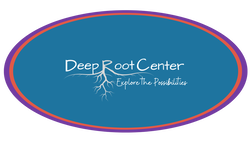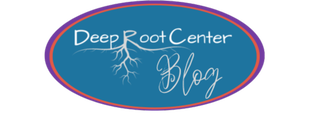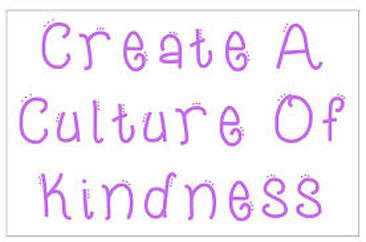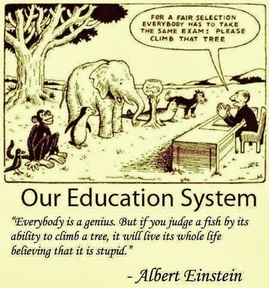|
Did you know in the spread of socially accepted ideas, a very small percentage of the population needs to hold something true before it becomes adopted by a large number of people? This phenomenon is referred to as the “Tipping Point.” The following quote comes from a July 2011 RPI News article (http://news.rpi.edu/luwakkey/2902): Scientists at Rensselaer Polytechnic Institute have found that when just 10 percent of the population holds an unshakable belief, their belief will always be adopted by the majority of the society.
In my lifetime, we have seen this happen with many formerly taboo subjects and ideas, ranging from gender equality and gay rights to environmental “green” living issues. And now, education pioneers are busy creating the latest Tipping Point around self-directed, independent, student centered learning. Those of us who are creating self-directed learning centers have been shy about using the term home-school when introducing and explaining our learning model. But in recent weeks, I am discovering we don't need to be. I believe our society is approaching that all important Tipping Point that says home-schooling is not weird, strange, anti-social, or for those people over there who don't fit into our world view. There are so many parents who are seeking an alternative because their child is unhappy, disenfranchised, and/or vulnerable in their current educational situation. And when someone is desperate, they are willing to look at something they may have viewed as incompatible with their lifestyle in a whole new light. Home-schooling, as mentioned in a previous post entitled A Means to an End, can be whatever works for each individual family. It can include becoming a member of a learning center such as Deep Root Center, taking on-line classes, participating in college classes, using and becoming familiar with local college and public libraries as well as the multitude of other community resources, and seeking out internships or shadowing opportunities, to just name a few options. Thirteen year old Logan from this TedX Talk describes his home-school experience as “hack-schooling”—a process in which you take what you want from multiple sources and create a life. Sounds radical, right? But, as we get closer to the Tipping Point, this approach to education will become the societal norm.
0 Comments
 by: Maria Corse Seems like a no-brainer, right? How many times have you heard, “if you don't have anything nice to say, don't say anything at all,” in your lifetime or at least during your childhood? Did you realize all of the major and most of the minor world religions have a “golden rule”? Besides, it just makes you feel good to be a pleasant presence in the crowd. Positive actions attract positive emotions. In that case, why on earth do we see and hear such disheartening cruelty? I know it isn't new; we have been treating each other badly from the beginning of time. The advent of Internet and social media just make it seem more prevalent. This is another basic anthropological concept called “The Other.” As humans, we feel most comfortable around others that have ideas that closely align to our own world view. And, it is easier to put down or show violence towards anything outside that comfort zone, because we perceive it internally as “bad”. Is it possible to go beyond some of those natural tendencies? I believe as learning, growing human beings, it is! This quote from Neil DeGrasse Tyson, one of my favorite scientists, is great advice: “ My view is that if your philosophy is not unsettled daily then you are blind to all the universe has to offer.” In order to follow his advice you have to be willing to leave your comfort zone and believe someone else may have a better idea or solution. That doesn't necessarily mean we have to adopt their view, it just translates into an understanding that we are all different, and that's okay. What an awesome opportunity to learn, and to become kinder and more empathetic to our fellow humans! Can you imagine a world where everyone went out of their way to help or simply listen to someone else? What if we all made it our life mission to be kind, even when we are in a bad mood or are personally having a horrible, rotten, no-good day? There are multiple examples of kindness, publicized and invisible, occurring in every town in every part of the planet and it is making a difference. This is your opportunity to influence the attitude in your corner of the world. Practice being gentle with your fellow humans, and they will pay it forward, because feeling good is contagious.  Education. What do you think of when you hear that word? The mental image usually consists of one person at a desk in a classroom working alone on worksheets, listening to a lecture or instruction, doing math, writing a paper, doing homework, or researching on the computer. In a conventional classroom setting, working together to solve math problems or any other traditional school work activity is usually frowned upon. Because if ideas are shared by two or more students, they are cheating. Recently, I was the witness to some kids playing an imaginative game at the Center. I don't remember the exact circumstances, but I heard the 6 year old tell the 7 year old, “that is cheating.” I was amazed, even our youngest are conditioned to view anything that we don't achieve independently as cheating. When did we lose our ability to celebrate and encourage collaboration? When did pulling yourself up by the bootstraps and the independent spirit become the norm? Did it occur when education became the responsibility of the state or when specific knowledge became more important than learning how to learn? Or maybe, it happened as people in the US moved west and relied less and less on each other because there were fewer people around. It would be an interesting study to pursue, someday. In egalitarian societies, cooperation is the key to the greatest number of members survival. Everything that is learned is then shared with someone else. Are they accused of cheating? No, they are simply passing on survival techniques. Everyone who is educated can become a successful, thriving member of the group. Interestingly, this is also one part of the technical definition for culture. (Yup, Anthropology geek is here again.) I would like to argue that collaboration is the purest form of education. Sharing ideas and brain storms increases everyones knowledge. We are empowering everyone with the ability of knowing how to think, not just telling them what to think. This is especially profound when the sharing happens across generations or even different age groups. Have you ever watched a 10 year old play together with a 5 year old? Have you wondered who is benefiting more from the interaction? The younger child may be learning more worldly things, but the older child could be remembering how to be real and unafraid of societal expectations. This interplay is in fact mutually beneficial. Self-directed learning sounds like it would be an independent pursuit; no help needed, just point me towards the knowledge and I will learn it all by myself. However, independent learning often requires a conversation between two or more people that involves the sharing of ideas; the talking and interaction is what allows for learning to happen. And on the most fundamental level, that is what Deep Root Center offers kids; the space, and the time for exploration of ideas through discussion and collaboration within a multi-age setting. 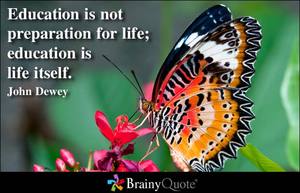 It is that time of year again. Parents and kids are gearing up for a new school year. And, I mean literally. Have you seen all of the new paraphernalia and gadgetry disguised as school supplies? Or, have you gotten one of those supply lists from the school? However, I digress, this is not a harangue about our societies obsession with stuff; I can save that rant for another day. Some of those kids who are getting and being prepared are apprehensive about the start of a new academic year. In many cases, you may not even realize how your child is feeling about going back to school, because it may not be as blatant as, “I don't want to go to school.” It may in fact be much more subtle. Jerry Mintz from AERO (Alternative Education Resource Organization) has created this list of ten signs your child may exhibit if they need something other than school. Yes, there are other options and not going to school is one of them. In todays world, with access to learning literally at your fingertips, education can happen anywhere and it does. Think about all the milestones your child was able to achieve within the few short years of infancy and toddler-hood. In most cases, you probably didn't worry about them learning to roll-over, smile, focus on an object, make sounds, cry when they wanted something, crawl, walk, talk, feed themselves, behave differently around different people, etc. They learned all of that by observing and trying it out on their own. Of course they had caring adults and family members to offer support and love, but everything young children learn is because they either need or want to. So, why should we be concerned when a child hits four or five that they aren't going to continue to desire new skills and knowledge? When you think about it that way, it almost seems absurd. We are all designed to be self-directed, intrinsically motivated human beings. Children can continue on that independent path through-out their lives. They don't need extrinsic motivation at all. We simply have to stand back, offer resources, encouragement, time and space for all of that learning to happen. If you feel your child is craving a learning space other than school, Deep Root Center is that option in the St. Lawrence Valley. We celebrate each individual child by listening to them expound on what they find most exciting. We honor their particular learning style and find ways to capitalize on their strengths. We make connections in the community to make sure their interests and passions are fed by people who practice them everyday. We facilitate learning opportunities that are inquiry driven not knowledge or curriculum driven. We focus on each child and work together to tailor an educational plan that fits them perfectly. Simply stated, Deep Root Center offers the opportunity to learn how to learn, while creating a space of safety, respect, trust and acceptance. If you would like to learn more about Deep Root Center and all of the opportunities it offers your child, we are holding an information session, Wednesday, August 20th at 6pm. Rebecca Pickens, a homeschool consultant, will be here to discuss the legalities and logistics of homeschooling. We will then have a question and answer session about Deep Root Center. Youth are invited to attend the session to learn more about this option as well. I look forward to answering all of your questions. *For further information about self-directed learning, you can read this article in the Huffington Post by Catherine Gobron, the program director at North Star: Self-Directed Learning for Teens.  I just watched this Ted Talk by Shaka Senghor, a man who was in prison for 19 years for murder. He speaks of transformations, forgiveness, and atonement. But what struck me the most is his belief that his story of coming out of prison and becoming an integral part of society, should not be unique. He said, “Anyone can have a transformation if we create the space for that to happen.” Everyone has the ability to change. Everyone should have to opportunity to prove themselves. Everyone should be given the chance to transform, apologize, and atone for their misdeeds. As I think about this on a deeper level it occurs to me, this doesn't simply apply to incarcerated men and women. This concept can also be used to think about students who for whatever reason have challenged the status quo and have been kicked out of school, have been labeled as troublemakers, or sit quietly in the back of the classroom seething with impatience and bitterness and never hand in their homework. Deep Root Center's fourth Guiding Principles states it best: How people behave under one set of circumstances does not predict how they will behave under a very different set of circumstances. ...When we change the approach, the structure, and the assumptions, all kinds of other changes often follow. Give yourself the gift of watching and listening to this man and allow yourself to wonder what if... 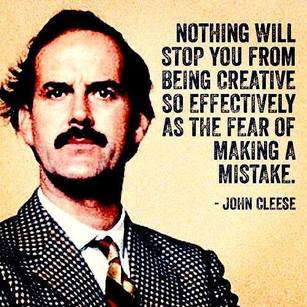 Who doesn't love John Cleese? Who doesn't love John Cleese? Contrary to popular opinion, being creative does not simply mean being artistic or crafty. Creativity comes from deep inside and is often in response to a challenge or problem. Sometimes this process is referred to as “thinking outside the box”, or “brain storming”. I would really like to be the artsy kind of creative, but have to work really hard at it. The problem is not my understanding of the concepts of design, which I get on an intuitive level; implementation is where the difficulty lays. Thankfully, I have a family of artists at my beck and call (Well, mostly. It may involve a few FB messages that read something like, “Hey, Ian can you make an inverted version of the logo with the slogan?” “Yo, Ian!”) And, the header on our website is an amazing collage MacKenzie created for my birthday last year. Our home is a gallery filled with all of that artistry. Everyone has the capacity and capability to be creative. Yes, everyone! We all have thoughts and ideas. We all have moments of sheer brilliance, which we are sure will become the latest fad or at the very least get us some positive feedback. The key to all of this is having the time and space to ruminate and tinker, combined with the confidence of knowing we can create something worthwhile. People who are self-assured are more likely to produce ideas, concepts, services, or products that other people are going to buy into. These are the folks who are making it up as they go along, are the “experts”, and are successful. Translate that to happy, engaged and passionate about life. So how do we produce these confident, creative, audacious, fear-less adults? We start with the fear-less, audacious, creative, confident children who surround us and watch them follow their interests and passions. We allow them the time and space they need to flower and grow. We celebrate their successes and challenge them to do their very best. We support them through disappointment. We understand there will be down days and mistakes, because that is all part of life. And then when it is time (and they will let us know when), we simply send them off into the world with love. |
|
© 2024 Whole Learners, Inc. 501(c)3
Deep Root Center
48 Riverside Drive, Canton, NY 13617
315*323*1435/[email protected]
Deep Root Center
48 Riverside Drive, Canton, NY 13617
315*323*1435/[email protected]
